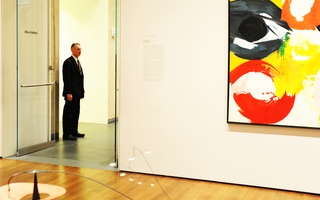Harvard University Security, Parking and Museum Guards Union, the University’s smallest union, voted Tuesday to ratify a new contract that offers workers higher pay, more personal days, and a fund to help members pay for health care.
Forty-six members of the 80-person union voted to adopt the contract, while two voted against the contract and one worker was undecided, according to Curt E. Rheault, a union organizer. Many union members did not vote during the two voting sessions that the union held on Monday because of conflicts with work, and the union only counted ballots from members who voted in person.
{shortcode-c65dc3a19c8d6e4111f7e9415f7c4be8775b53b2}Even though 31 union members did not vote in the election, 46 votes were enough to ratify the contract. According to the union’s bylaws, a majority of voters in the election must vote to ratify the contract, and that majority must include at least 20 votes.
The University and HUSPMGU reached an agreement on the contract last week after months of negotiations.
Under the new contract, union members will receive a 3 percent pay increase on July 1, 2017, July 1, 2018, and July 1, 2019. In addition, the new contract increases the number of sick days that union members have in their “sick bank”—the number of unused sick days that workers can save to use later—from 25 to 30. They will also have one more sick day per year than under the former contract.
Rheault said that this contract was the first in 14 years that provides HUSPMGU workers with benefits comparable to those available to members of other Harvard unions. For many union members, “this was the first contract where the union hadn’t fallen behind,” Rheault said.
In an emailed statement, University spokesperson Tania deLuzuriaga wrote that Harvard provided equitable benefits to HUSPMGU members.
“The HUSPMGU agreement is consistent with other represented groups on campus and provides competitive wages and benefits to those in the respective industries—in this case, Parking and Museum Attendants,” she wrote.
In addition to increasing pay, the contract lowers the cost of health care for HUSPMGU members. On Jan. 1, 2018, the union’s premiums will decrease from 15 percent to 13 percent while cost of co-pays will rise.
To help union employees afford the higher costs of co-payments, the new contract creates a flexible spending account that contains money workers can spend on medical expenses.The University will add $275 to each individual’s account every year starting in 2018.
The new contract will also compensate Museum employees who staff events at an increased rate and provides union members with access to cheaper parking spaces near Harvard Square.
“We asked the members what they liked about and I think what they liked most was that we negotiated for such a long time and they thought we probably got the best we could have gotten,” said Rheault. “They liked the fact that we worked really hard.”
The new contract will be applied retroactively to union members starting on July 1, 2016 and will last until July 1, 2020.
— Staff writer Caroline S. Engelmayer can be reached at caroline.engelmayer@thecrimson.com. Follow her on Twitter @cengelmayer13.
Read more in University News
Former Navy Secretary Discusses Future of WarRecommended Articles
-
Harvard Proposes 50-Cent Wage Hike For Kitchen StaffThe shop steward of the College dining hall workers union said yesterday that a tentative agreement has been reached between
-
Two Unions Agree on DealsFollowing six months of negotiations most noteworthy for the relative ease with which they proceeded, the Harvard Police Association and
-
UMass Union Approves Pact For Higher Teacher SalariesThe University of Massachusetts Society of Professors and Faculty Staff Union (MSP-FSI) voted Wednesday night to approve a three-year contract
-
University, Dining Workers Resume Contract TalksContract negotiations between the University and Local 26, representing Harvard's dining hall workers, resumed yesterday after a month-long hiatus, with
-
 Security and Museum Parking Employees Union Negotiations Move to Federal Mediation
Security and Museum Parking Employees Union Negotiations Move to Federal Mediation













